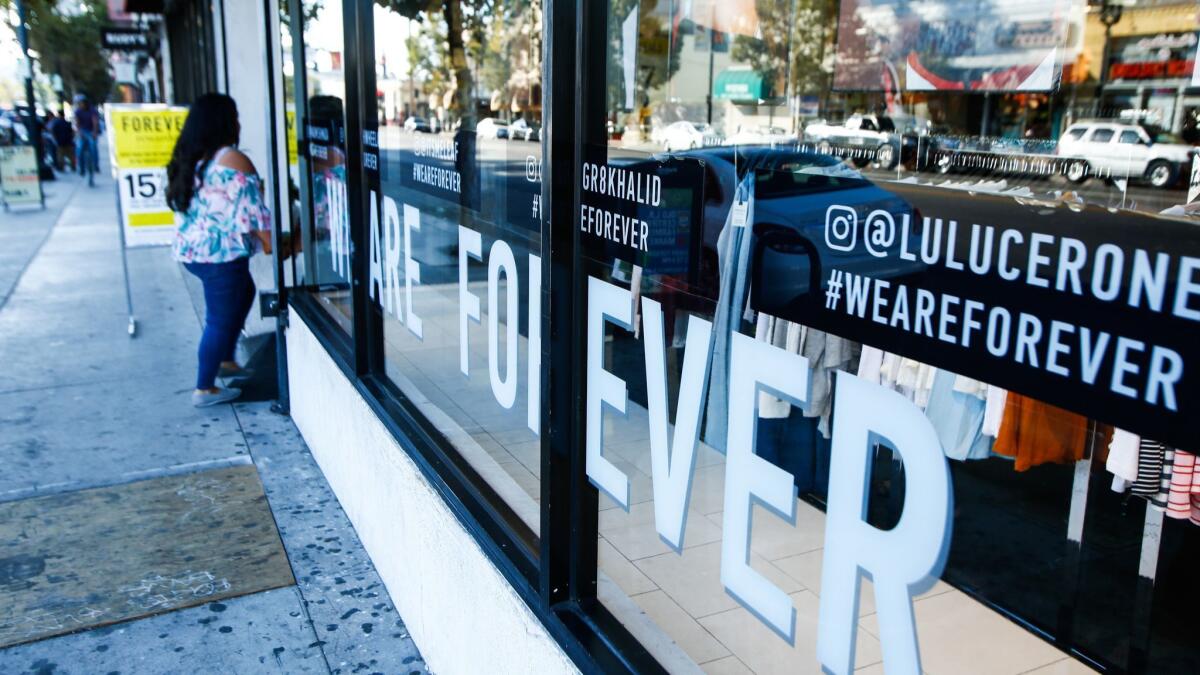Forever 21 officials approached landlords about buying a stake in the chain

- Share via
A small faction of officials at Forever 21 Inc. has asked the clothing retailer’s biggest landlords if they’d consider taking a stake in the company, as Forever 21’s leadership battles internally about how to turn around the struggling chain.
The group, which didn’t have the backing of the company’s co-founder, talked to Simon Property Group Inc. and Brookfield Property Partners about a range of options including a sale, according to people with knowledge of the matter. A rival set of officials, aligned with co-founder Do Won Chang, has opposed any such deal with landlords, the people said, as Chang wants to preserve control over the empire that made him a billionaire.
A representative for Forever 21 said the company had not had talks with landlords outside of rent negotiations. “While Forever 21’s policy is not to comment on speculations, we feel it’s important to refute these rumors, which are categorically incorrect,” the company said in a statement. “As a normal course of business, Forever 21 has been in regular rent renegotiation meetings. We have not had any conversations with mall operators regarding an investment in the company, nor a sale.”
There is a precedent for landlords taking over retailers. In 2016, teen clothing chain Aeropostale Inc. sold itself in bankruptcy to a group including the two biggest U.S. mall owners. With Forever 21, the situation is fluid, and it’s not clear how the company will restructure, said the people, who asked not to be identified because the discussions were private.
As retailers nationwide struggle to boost sales, Simon Property Group and Brookfield Property Partners — the biggest owners of malls in the United States — are increasingly willing to discuss a wide range of options with tenants, including making steep concessions in leases. Online stores are winning more business, and malls are finding it harder to gain foot traffic.
Representatives for Simon Property Group and Brookfield Property Partners declined to comment.
Forever 21 operates more than 800 stores in the United States, Europe, Asia and Latin America, with most in the United States. Chang and his wife, Jin Sook Chang, whose daughters now help run the company, opened their first store in Los Angeles in 1984 and established it as a destination for younger shoppers looking for trendy clothes at affordable prices. But competitors have crowded into the segment, including H&M, Target and new online sellers.
Forever 21 is a key tenant to both landlords. Indianapolis-based Simon, the largest U.S. mall owner, counts Forever 21 as its sixth-largest inline store tenant, with 99 outlets covering 1.5 million square feet and accounting for 1.4% of the company’s total base minimum rent in the United States, according to a filing as of March 31.
For Brookfield Property Partners — a unit of Toronto-based Brookfield Asset Management Inc. — Forever 21 accounted for 2% of its minimum rents, according to a filing as of March 31. Last year Brookfield bought GGP Inc., the second-largest U.S. mall operator.
“Mall REIT exposure to Forever 21 is definitely bigger than most department stores, which pay very little base rent per square foot,” said Bloomberg Intelligence analyst Lindsay Dutch.
Forever 21’s management, although fractured, has been busy over the last few weeks, holding discussions with lenders including Apollo Global Management about potential bankruptcy financing. It has added investment bank Lazard Ltd. and law firm Kirkland & Ellis to its roster of advisors. It had tapped Latham & Watkins, its longtime legal counsel, for restructuring advice before adding Kirkland & Ellis. Latham & Watkins didn’t comment.
Forever 21 is trying to avoid falling victim to the retail shakeout that destroyed dominant chains such as Borders Group and Sports Authority as consumers defected to online merchants. Many of the failed stores had been bought out by private equity firms that loaded the companies up with debt, leaving them unable to make investments needed to compete with rivals such as Amazon.com Inc.
More to Read
Inside the business of entertainment
The Wide Shot brings you news, analysis and insights on everything from streaming wars to production — and what it all means for the future.
You may occasionally receive promotional content from the Los Angeles Times.









